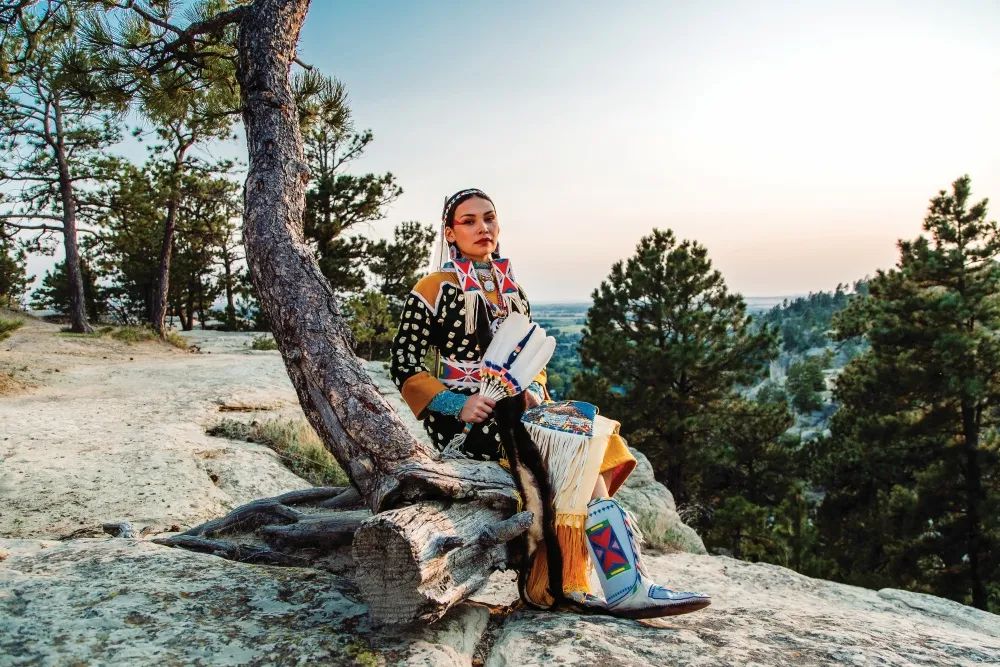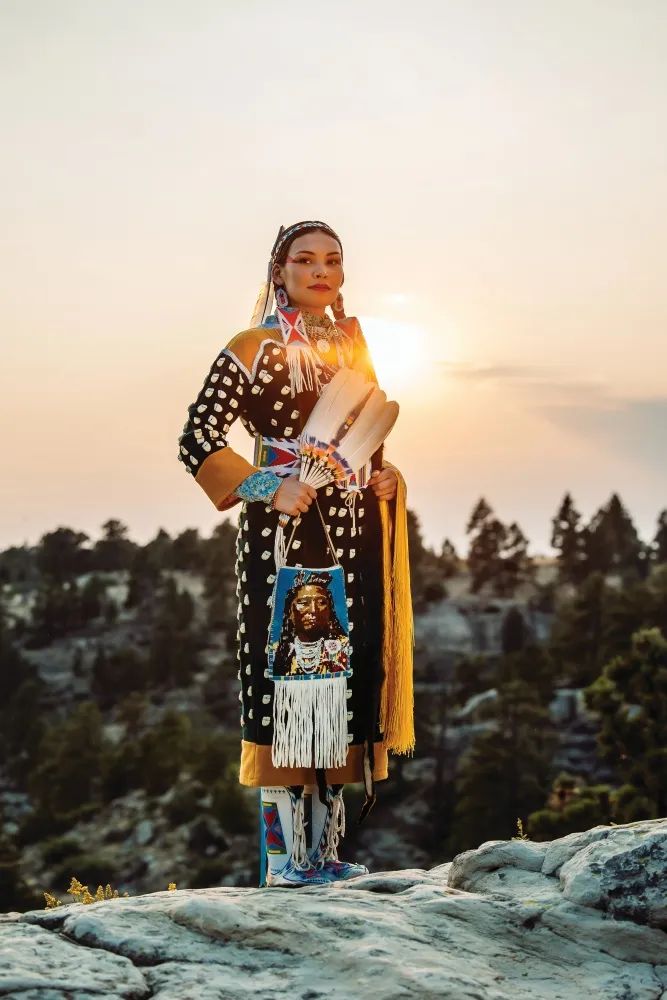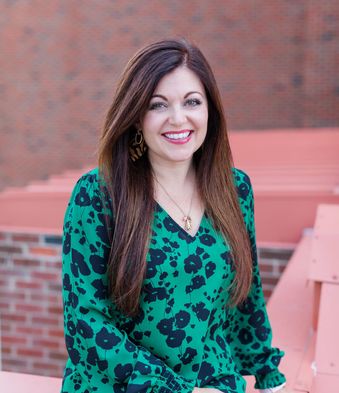
Dare to Know: One Woman’s Story of Embracing Apsaaloóke Culture
October 2021
by katie jones backer | photos by arianna skoog
There is something incredibly beautiful and empowering about knowing oneself. Kaitlin Hugs shares her story of growing up as a member of the Crow Tribe. We see resilience, beauty, strength, and passion throughout the narrative of her history and culture. I am proud to introduce you to my former Senior High student, Kaitlin.
“My name is Kaitlin Hugs. I am an enrolled member of the Crow Tribe, the Apsaaloóke. My Crow name is “Ihkawiía,” which means “Star Woman,” and was given to me by my great-aunt Shirleen. I am also of Norwegian descent from my mother’s side.”
Although Kaitlin grew up in Billings [attending Lockwood then Senior High], she says she's always felt more at home in Pryor, Montana, surrounded by her culture and history. "I would say that this is where my love of history stems.”
Kaitlin is currently a senior at MSUB, majoring in History Education, with a minor in Political Science and a Broad Field Social Studies endorsement; she's on track to graduate in December. Through her time in school, she has maintained a full-time job at Pictograph Cave State Park, while also substitute teaching, and acting as an Indian Education for All Cultural presenter. Kaitlin is also a facilitator for a project with Global Peace Foundation called Cross-Community Reconciliation Project, "In which we aim to build pride and close gaps of racial disparity in our Billings community between Native and non-Native community members for a more inclusive and empathetic society.” She also volunteers for various panels and forums discussing Native American issues, such as Missing and Murdered Indigenous People and Education.
Family and Culture
When she was 4 years old, Kaitlin started dancing at local powwows, explaining, “My great-aunt Shirleen made me my first Elk Tooth Dress. My family is known for beadwork, traditional regalia, and some significant Crow songs, specifically the Arrow Creek (Pryor) District song on the reservation.” In middle school, Kaitlin started traveling for powwows. “I started going to Cody Powwow, and my dad started singing with a drum group that traveled with us as well. Soon, the rest of my family was traveling with us.”
Kaitlin says, “Powwows… are very important because they give people an opportunity to celebrate the resiliency of our traditional songs, regalia, customs, practices, and people. They are a celebration and appreciation for all. People are given a chance to be proud and show off their skills.” While building a community, Kaitlin relished the opportunity to share something and feel grounded in her culture together with her family. “With every bead and stitch are love, and the generations of knowledge and wisdom.” The whole family was involved, with aunties, dad, and Kaitlin pulling all-nighters to ensure her outfits were ready. Her Norwegian grandparents financed her, took her to every powwow, and sat proudly in the stands for hours. And, her grandpa spent hours researching traditional patterns and sewing dresses. “I still have them all, each inscribed with a tab, Made with Love, By Grandpa,” says Kaitlin.
Kaitlin says, “It is so meaningful to participate and know you are carrying on generations of tradition and passion.” At a young age, she was told to, “Dance for those who can't anymore.” She holds this close to her heart while thinking of her ancestors, elders, family members, friends, and others without the ability or means to participate in something so meaningful.
Education
Though accepted to all major schools in Montana, Kaitlin chose MSUB to be close to her sick grandmother. She says, “It was the best decision I have ever made because I spent one last semester with her and my grandpa.” By this point, she fell in love with MSUB and the History Department. Kaitlin loves the small campus, which provides a sense of community and purpose, and she discovered firsthand that the faculty is there with the mentality of students first. “Through my grieving process, I felt supported and like I had a community behind me [especially found in the Native American Achievement Center]. Home was behind its doors, with friends, food, and an environment to feel safe and relatable in.”
A Love for History and Culture
Kaitlin’s love of history stems from her belief that “Knowing history and culture gives you priceless tools to understand and interact with the world in a compassionate and empathetic way.” She has also discovered how it can provide purpose in life. Kaitlin tells her students, “History is important, knowing your culture and heritage is important. If you know where you come from, you know who you are today, and you're informed of where you're going to go in the future." She goes on to explain, “For Native peoples, we have to celebrate our culture…. We cannot let our history slip away, or else the fight that our ancestors put in will not be worth it. As we lose our elders, so much history and knowledge dies with them. We have to take the opportunity to learn as much as we can because in that knowledge is power, resiliency, and pride.”

For a long time, Kaitlin struggled to be proud of both heritages. She says, “I was too white for the Natives and too Native for the whites.” She ultimately learned that fortitude goes a long way if you are of strong identity, knowledge, and heart. “I have taken the time and energy to learn as much as I can. I question anything and everything; I try to have the hard, taboo conversations. I admit when I am wrong, try to learn again, and try to carry myself with humility and grace.”
Immanuel Kant wrote [during the Enlightenment], “Sapere Aude,” which means, “Dare to Know.” Kaitlin has this tattooed on her forearm as a constant reminder to always seek knowledge. She says, “As a Native American woman in a largely male discipline, I feel I have a real opportunity to bring a new and fresh perspective to history, subject matter, and the classroom.”
A Look at the MSU Billings Native American Achievement Center (NAAC):
Sunny Day Real Bird, Director of the NAAC, shared, "Growing up in Billings, I was always the only Indian girl in class. And being on food stamps and living in section eight housing, I learned early on the power of education," which has led to her passion for teaching and (now in her current role) inspiring Native students to pursue higher education.
The NAAC has two outreach centers: MSUB Campus and City College. Their mission is to recruit and retain American Indian students (from all over the country and various Tribal backgrounds) and help provide academic and social support. Presently, over 300 students benefit from this program (with a rising number each year!). Located on 2630 Normal Ave (west of MSU Billings campus) in a two-story house (with a basement), students can utilize the computer lab and printer, washer/dryer, a playground for parents with young children, a garden, and even a sweat lodge. This facility has made the transition into college life smoother and more sustainable, allowing the students to connect with a supportive, family-like community. Sunny Day and her team work continually to ensure students have resources and feel supported. As Kaitlin Hugs shares, "I was able to face school head-on with grace and composure because I had a place to feel comfortable and supported through my highs and lows as a student [at MSUB]."
Originally printed in the October 2021 issue of Simply Local Magazine
Never miss an issue, check out SLM's digital editions here!





